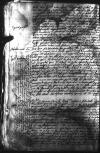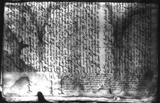List #5685
[Ioannes DANTISCUS] do [Samuel MACIEJOWSKI]Heilsberg (Lidzbark), 1539-06-24
Regest polski:
Popierając wyrażone w liście otwartym radców pruskich do króla [Zygmunta I] prośby, Dantyszek zwraca się do adresata o pomoc w nakłonieniu władcy, by łaskawiej niż poprzednio odniósł się do ich postulatu w sprawie przeniesienia sejmu [pruskiego] na dzień św. Michała [29 września], a także by w przydziale godności po śmierci kasztelana elbląskiego Ludwika Mortęskiego uwzględniono opinię radców pruskich.
Po raz kolejny zwraca się też o pomoc w pomyślnym załatwieniu sprawy kasztelana gdańskiego [Achacego Cemy], dotyczącej jeziora Drużno.
Dantyszek prosi adresata o obronę przed tymi, którzy wyłącznie jego obarczają odpowiedzialnością za decyzje podejmowane kolegialnie przez radców [pruskich]. Ostrzega, że jeśli w każdej sprawie będą musieli pisać do króla wspólnie, opóźnienia stąd wynikające okażą się szkodliwe dla spraw władcy, a przez to i dla państwa.
Dantyszek usprawiedliwia się przed Maciejowskim, że z powodu osłabienia wzroku w liście do niego i króla posłużył się ręką skryby. Sygnalizuje, że wkrótce wraz z [Tiedemannem Giese] opiszą niecne postępowanie, którego obaj doświadczyli jako biskupi chełmińscy ze strony tamtejszych poddanych królewskich.
Dantyszek oczekuje także pomocy adresata w związku z rozprzestrzenianiem się wśród elit w [Prusach Królewskich] luteranizmu.
Rękopiśmienne podstawy źródłowe:
Pomocnicze podstawy źródłowe:
Publikacje:
| ||||||||||||
Tekst + aparat krytyczny + komentarz Zwykły tekst Tekst + komentarz Tekst + aparat krytyczny
Reverende Domine, frater et amice carissime ac honoran(de) or honoran(dissime)⌈honoran(de)honoran(de) or honoran(dissime)⌉.
Salutem et fraterni amoris commendationem.
Quemadmodum paenultima Maii Dominationi Vestrae Reverendae cf.
De
Praeterea quid in novis et in aula agatur meque benevolentia sua prosequi non desinat. Qua me, rogo, contra eos tueatur, qui asserunt per me hic omnia fieri, quae ex communi fiunt consilio, quod quomodo habeat on the margin⌈quomodo habeatquomodo habeat on the margin⌉, in praesenti
Eandemque felicissime in diuturnitate vel Pylia[1] vivere et valere opto ex animo.
Dat(ae) or Dat(um)⌈Dat(ae)Dat(ae) or Dat(um)⌉
Postscript:
Quod manu mea serenissimae cf.
Scribet fortassis Dominationi Vestrae Reverendae reverendissimus
Quosdam de nostris, et qui de primis sunt, cepit inficere Luteranismus. Ii nisi reprimantur temporius, facile reliquiae satis ad hoc virus pronae subsequentur. Adiuvet Dominatio Vestra Reverenda, quantum potest.
Cuius fraterno amo paper damaged⌈[mo]mo paper damaged⌉ri me iterum commendo etc.


 AAWO, AB, D. 68, f. 279v
AAWO, AB, D. 68, f. 279v